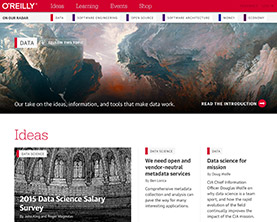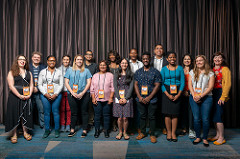About JupyterCon
Experience JupyterCon | Who Should Attend | Why Attend | Kudos | Program Chairs & Program Committee
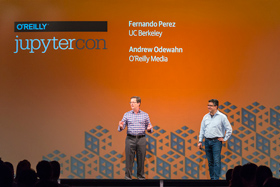
JupyterCon brings together data scientists, business analysts, researchers, educators, developers, and core Project contributors and tool creators for in-depth training, insightful keynotes, networking events, and practical talks exploring the Project Jupyter platform. JupyterCon focuses on real-world practices and how to successfully implement interactive computation in your workflow and projects. In just four days you’ll discover the best practices for collaborative and reproducible data science; new use cases, and the expertise you need to transform your workflow with Jupyter.
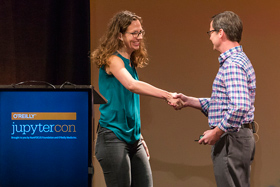
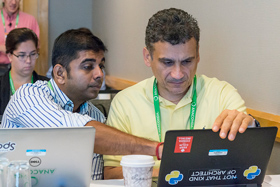
Experience JupyterCon
JupyterCon will educate and motivate by offering:
- Sessions that apply to the full range of Jupyter's languages and platforms
- Practical tutorials that go deep into technical skills, new features and applications, and best practices
- Visionary keynote presentations
- Immersive, hands-on training courses
- Unparalleled access to core Project contributors and tool creators
- A Sponsor Pavilion packed with related projects and products
- Community focused events, such as sprints, user testing, and birds-of-a-feather gatherings
- An evening Poster session featuring dozens of innovative Jupyter projects
- A vibrant "hallway track" where hundreds of programmers, data scientists, analysts, researchers, vendors, and users of all levels discuss important issues
- Fun evening events and plenty of informal networking
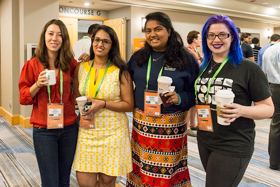

Who Should Attend
JupyterCon is for anyone who wants to better use Jupyter's tools, including:
- Developers and programmers
- Data scientists
- Business analysts
- Researchers
- Educators
- Users across all disciplines: Science, Engineering, the Arts, Digital Humanities, Digital Studies, Journalism, Library Science, and more
- System admins
- Hackers and geeks
- Enterprise developers and managers
- Community leaders and managers
- Companies building products and services for the open source ecosystem
Project Jupyter and O'Reilly Media are committed to promoting diversity and to creating a safe and productive environment for everyone at JupyterCon, and at all of our events. Read the JupyterCon code of conduct.
Why Attend?
In four information-packed days JupyterCon gives you the tools you need to make more effective use of the rich Jupyter ecosystem:

- Discover the advantages of using powerful, interactive tools and systems in all your projects that involve computation and data
- Learn how to develop custom tools that extend the Jupyter platform with new functionality that fits your specific needs (and discover great extensions created by others)
- See how others make their computational work more robust and reproducible
- Survey the landscape of educational materials available using Jupyter
- Learn about how to best deploy the Jupyter platform across your organization in an optimal way, from a small research or educational group to a large environment with customized authentication, cloud resources, and more
- Find out how to migrate from expensive commercial installations to a more efficient, cost-effective, open source solution
- Hear about the new directions of the Project and help shape its evolution with your own insights, use cases, and ideas.
- Receive hype-free guidance to help identify when Jupyter can be a good fit (or not!) for your organization and needs
What people are saying about JupyterCon
—Tim Dobbins, The General Auto Insurance
—Hilary Parker
—Kevin Miller (PhD), The University of the West Indies, Mona, Kingston, Jamaica
—Rachel Thomas
—John Detlefs
—M. Tahir Ashraf, Masdar Institute
—Sabrina Feder, Data Science Consultant
—Ashutosh
—Adam Thornton, LSST
Program Chairs
 Fernando Perez
Fernando Perez
is an assistant professor in Statistics at UC Berkeley and a Faculty Scientist in the Department of Data Science and Technology at Lawrence Berkeley National Laboratory. After completing a PhD in particle physics at the University of Colorado at Boulder, his postdoctoral research in applied mathematics centered on the development of fast algorithms for the solution of partial differential equations in multiple dimensions. Today, his research focuses on creating tools for modern computational research and data science across domain disciplines, with an emphasis on high-level languages, interactive and literate computing, and reproducible research. He created IPython while a graduate student in 2001 and co-founded its successor, Project Jupyter. The Jupyter team collaborates openly to create the next generation of tools for human-driven computational exploration, data analysis, scientific insight and education.
He is a National Academy of Science Kavli Frontiers of Science Fellow and a Senior Fellow and founding co-investigator of the Berkeley Institute for Data Science. He is a co-founder of the NumFOCUS Foundation, and a member of the Python Software Foundation. He is the recipient of the 2012 Award for the Advancement of Free Software from the Free Software Foundation.
 Paco Nathan
Paco Nathan
Known as a "player/coach", with core expertise in data science, natural language processing, machine learning, cloud computing; 35+ years tech industry experience, ranging from Bell Labs to early-stage start-ups. Co-chair JupyterCon, host of Executive Briefings at The AI Conf and Strata Data. Evangelist for Computable. Advisor for Amplify Partners, Deep Learning Analytics, Recognai. Recent roles: Director, Learning Group @ O’Reilly Media; Director, Community Evangelism @ Databricks and Apache Spark. Cited in 2015 as one of the Top 30 People in Big Data and Analytics by Innovation Enterprise.
 Brian Granger
Brian Granger
is an associate professor of physics and data science at Cal Poly State University in San Luis Obispo, CA. His research focuses on building open-source tools for interactive computing, data science, and data visualization. Brian is a leader of the IPython project, co-founder of Project Jupyter, co-founder of the Altair project for statistical visualization, and an active contributor to a number of other open-source projects focused on data science in Python. He is an advisory board member of NumFOCUS and a faculty fellow of the Cal Poly Center for Innovation and Entrepreneurship.
Program Chair Emeritus
 Andrew Odewahn
Andrew Odewahn
is the CTO of O'Reilly Media, where he helps define and create the new products, services, and business models that will help O'Reilly continue to make the transition to an increasingly digital future. The author of two books on database development, he has experience as a software developer and consultant in a number of industries, including manufacturing, pharmaceuticals, and publishing. Andrew has an MBA from New York University and a degree in computer science from the University of Alabama. He's also thru-hiked the Appalachian Trail from Georgia to Maine.
Committee members
- Dan Allan, BNL
- Ian Allison, PIMS Canada
- Paige Bailey, Azure
- Lorena Barba
- Matthias Bussonnier, Berkeley Institute for Data Science
- Tom Caswell, matplotlib
- Afshin Darian, Quansight
- John Detlefs, BTC Labs
- Chris Erdmann, NC State libraries
- Jessica Forde, Jupyter
- Stuart Geiger, BIDS
- Tim George, Jupyter/CalPoly
- Michelle Gill, Metis, ex-NIH
- Tim Head, Wild Tree Tech
- Jennifer Klay, Cal Poly/NumFOCUS
- Emily Jane McTavish, UC Merced/ Software carpentry
- Cierra Martinez, BIDS
- Omoju Miller, Github
- M Pacer, Jupyter/BIDS
- Peter Parente, Valassis Digital
- Steve Silvester, Quansight
- Eszti Schoell, O'Reilly Media
- Robert Talbert
- Dwight Townsend, Cal Poly
- Wolf Wollprecht, Quantstack
- Kevin Zielnicki, Stitchfix
Sponsorship Opportunities
For exhibition and sponsorship opportunities, email jupytersponsorships@oreilly.com
Partner Opportunities
For information on trade opportunities with JupyterCon, email partners@oreilly.com
Contact Us
View a complete list of JupyterCon contacts
©2018, O'Reilly Media, Inc. • (800) 889-8969 or (707) 827-7019 • Monday-Friday 7:30am-5pm PT • All trademarks and registered trademarks appearing on oreilly.com are the property of their respective owners. • confreg@oreilly.com
